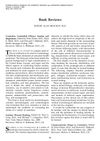 21 citations,
October 2008 in “Indian Journal of Plastic Surgery”
21 citations,
October 2008 in “Indian Journal of Plastic Surgery” Hair transplantation surgery has improved, giving more natural results, and success depends on a skilled team and proper technique.
 13 citations,
January 2017 in “Cosmetics”
13 citations,
January 2017 in “Cosmetics” Different tests are used to see how hair care products affect hair, and choosing the right test is important for accurate results.
 September 2019 in “International journal of research in ayurveda and pharmacy”
September 2019 in “International journal of research in ayurveda and pharmacy” Ayurvedic treatment with Bhringraj Vati and coconut oil was safe and effective for reducing hair fall.
 72 citations,
July 2008 in “Dermatologic Therapy”
72 citations,
July 2008 in “Dermatologic Therapy” CCCA is a scarring hair loss condition mainly in African descent women, possibly caused by genetics and hairstyling, treated with gentle hair care and medications.
 37 citations,
April 2013 in “Plastic and Reconstructive Surgery”
37 citations,
April 2013 in “Plastic and Reconstructive Surgery” Genetic and environmental factors, like smoking and exercise, affect male hair loss.
 32 citations,
January 2008 in “Journal of Microencapsulation”
32 citations,
January 2008 in “Journal of Microencapsulation” Cosmetics with hinokitiol-loaded nanocapsules were found to effectively promote hair growth.
 30 citations,
November 2008 in “Facial Plastic Surgery”
30 citations,
November 2008 in “Facial Plastic Surgery” The conclusion is that the best approach for treating Female Pattern Hair Loss is a combination of different treatments.
 1 citations,
January 2020
1 citations,
January 2020 The pomegranate-based herbal shampoo works well and is safe for daily use.
 May 2020 in “International journal of current microbiology and applied sciences”
May 2020 in “International journal of current microbiology and applied sciences” A Pug with skin issues was successfully treated for mite and bacterial infections.
 October 2018 in “IOP conference series. Materials science and engineering”
October 2018 in “IOP conference series. Materials science and engineering” Coffee residue extract significantly boosts hair growth.
 July 2018 in “Elsevier eBooks”
July 2018 in “Elsevier eBooks” Lichen Planopilaris is a hair loss condition best treated early with various medications, including hydroxychloroquine, to prevent permanent baldness.
 May 2013 in “Trends in Urology & Men's Health”
May 2013 in “Trends in Urology & Men's Health” Male-pattern hair loss is normal, often involves hormone effects on hair follicles, and can be treated with medication or surgery, but new treatments are being researched.
 July 2011 in “Springer eBooks”
July 2011 in “Springer eBooks” The document concluded that FDA-approved treatments like minoxidil and finasteride are effective for hair loss, while the effectiveness of natural remedies and other non-approved treatments is not well-supported by evidence.
 March 2001 in “International Journal of Cosmetic Surgery and Aesthetic Dermatology”
March 2001 in “International Journal of Cosmetic Surgery and Aesthetic Dermatology” The document covers books on cosmetic surgery and skin care, discussing legal and ethical issues, wound healing, the overlap of cosmetics and drugs, and detailed plastic surgery techniques.
 212 citations,
September 2008 in “Journal of The American Academy of Dermatology”
212 citations,
September 2008 in “Journal of The American Academy of Dermatology” Minoxidil and finasteride treat hair loss in men, while minoxidil treats hair loss in women.
 110 citations,
August 2016 in “Drugs”
110 citations,
August 2016 in “Drugs” Minoxidil is the only FDA-approved topical drug for treating male or female pattern hair loss, and other medications like finasteride and dutasteride can also increase hair growth.
 105 citations,
April 2004 in “Dermatologic Therapy”
105 citations,
April 2004 in “Dermatologic Therapy” The document concludes that proper diagnosis and a combination of medical, hair-care, and surgical treatments are important for managing alopecia in black women.
 99 citations,
June 2005 in “Journal of Cosmetic Dermatology”
99 citations,
June 2005 in “Journal of Cosmetic Dermatology” Hair ages due to genetics and environmental factors, leading to graying and thinning, with treatments available for some conditions.
 72 citations,
July 2003 in “Journal of cosmetic dermatology”
72 citations,
July 2003 in “Journal of cosmetic dermatology” Frequent hair coloring and styling can damage hair and cause breakage or loss.
 64 citations,
January 2004 in “American journal of clinical dermatology”
64 citations,
January 2004 in “American journal of clinical dermatology” Folliculitis is an inflammation of hair follicles that requires proper diagnosis and treatment based on the specific cause.
 48 citations,
July 2001 in “Clinics in Dermatology”
48 citations,
July 2001 in “Clinics in Dermatology” Cosmetics enhance beauty, fix defects, and intimidate enemies, with varying cultural standards and alternative methods.
 45 citations,
August 2019 in “Dermatologic Therapy”
45 citations,
August 2019 in “Dermatologic Therapy” Hair loss treatments work better with lifestyle changes.
 40 citations,
July 2017 in “Frontiers in Medicine”
40 citations,
July 2017 in “Frontiers in Medicine” Early and personalized treatment for hair loss in young people is crucial to prevent permanent damage and should include psychological support.
 39 citations,
June 2019 in “Toxins”
39 citations,
June 2019 in “Toxins” Bee venom might be a good alternative treatment for various skin conditions because it has many healing properties.
 27 citations,
September 2017 in “Journal of Investigative Dermatology Symposium Proceedings”
27 citations,
September 2017 in “Journal of Investigative Dermatology Symposium Proceedings” Hair loss in black women needs more research, early intervention, and community education.
 21 citations,
June 2009 in “Current Medical Research and Opinion”
21 citations,
June 2009 in “Current Medical Research and Opinion” Most men with hair loss worry, try self-treatments, and delay doctor visits due to cost, uncertainty, and embarrassment.
 17 citations,
August 2015 in “Expert Opinion on Pharmacotherapy”
17 citations,
August 2015 in “Expert Opinion on Pharmacotherapy” The document concludes that oral finasteride and topical minoxidil are effective for genetic hair loss, while other treatments for different types of hair loss show promise but need more research.
 14 citations,
October 2019 in “Journal of Cellular Physiology”
14 citations,
October 2019 in “Journal of Cellular Physiology” Micrografts promote hair growth in androgenetic alopecia treatment.
 12 citations,
January 2007 in “Current problems in dermatology”
12 citations,
January 2007 in “Current problems in dermatology” Environmental and cosmetic factors, including heat, chemicals, and sun exposure, can cause hair loss and damage.
 11 citations,
July 2017 in “Expert Opinion on Investigational Drugs”
11 citations,
July 2017 in “Expert Opinion on Investigational Drugs” New hair loss treatments may include topical medications, injections, and improved transplant methods.






























